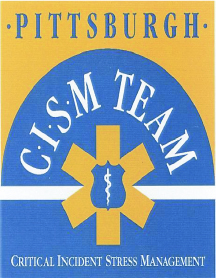Critical Incident Stress
Sometimes critical incidents can cause emotional reactions. Most reactions are normal, but can interfere with your daily life at work and at home.
Stress reactions can appear immediately after a Critical Incident, a few hours or even a few days after the incident. In some cases, reactions can occur weeks to months later. This information will help you to understand stress reactions.
Through the understanding and the support of coworkers and loved ones, stress reactions can be mitigated more quickly. Occasionally, an incident may be so emotionally overwhelming that assistance from mental health professionals may be helpful. Peers who are trained in Crisis Intervention, may also be helpful. These peers are training in what you probably know as CISM: Critical Incident Stress Management. Needing assistance does not imply that a person is weak. It simply means that the event was just too powerful for to be managed without assistance.
The Pittsburgh Critical Incident Stress Management Team is here to support you and provide you with a better understanding of your emotions, feelings, and reactions to a critical incident. We provide confidential crisis interventions to individuals and groups for all public safety personnel, industrial and hospital workers. At times, we have been asked to assist other agencies in helping communities for large scale critical incidents. Pittsburgh CISM does not conduct counseling. We are a group of public safety peers, mental health professionals, EAP specialists, clergy personnel, and therapy pets. All members of Pittsburgh CISM have been specially trained in crisis intervention.
The following categories provide examples of stress reactions. These can be disturbing to experience but are normal following a critical incident;
Physical reactions may include:
- Fatigue
- Thirst
- Headache, dizziness
- Visual disturbances
- Nausea, Vomiting
- Profuse sweating
- Chills
- Muscle cramps, Tremors, Twitching
- Rapid heart rate, Chest pain, Shortness of breath
- Elevated blood pressure
- Fainting
Emotional reactions may include:
- Apprehension or uncertainty
- Anxiety, irritability, agitation
- Intense Anger, Fear
- Guilt, grief, denial
- Depression, feeling overwhelmed
Cognitive reactions may include:
- Poor Concentration
- Intrusive thoughts or images
- Poor attention, easily distracted
- Forgetfulness, confusion
- Hypervigilance
- Inattention
- Poor problem solving
- Loss of time and place orientation
- Nightmares
- Looking for fault in self or others
- Questioning your own values
Behavioral reactions may include:
- Change in daily activity
- Withdrawal, self-isolation
- Intense anger
- Heightened startle response
- Sleep disturbances
- Increased smoking, alcohol consumption, recreational drug use
- Change in sexual function
If you identify yourself as becoming stressed, the following provide suggestions to help you cope:
- Exercise.
- Structure your time. Stay on task.
- Talk to people who were also involved in the incident.
- Reach out. People really do care!
- Give yourself permission to feel angry or sad, but not to extremes.
- Check in on co-workers.
- Keep a journal. Writing can be very therapeutic.
- Forgive yourself if you believe you have done something wrong.
- Avoid making significant life changes, but it is helpful to make decisions which provides a feeling of control of your own life.
- Eat a well balanced diet.
- Try to get plenty of rest.
You may find that your response to a critical incident may not be as strong as some of your coworkers who were exposed to the same event. The following are some guidelines to help you support others:
- Listen intently.
- Offer assistance.
- Respect confidentiality.
- Allow them some private time.
By remembering that these are all normal reactions and understanding ways to reduce the stress; our goal is to strengthen your normal coping mechanisms.
The Pittsburgh Critical Incident Stress management Team
For Urgent Interventions: call 412-647-CISD [2473]
Business: Pittsburgh CISM Team
c/o Allegheny County EMS Council
Credits: Treatment of The Human Stress Response
Critical Incident Stress Debriefing; second edition; Mitchell, Everly
revised 12/13 ed
